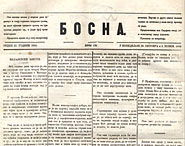Историја парламентаризма у БиХ
Период османске владавине
Кроз историју Босне и Херцеговине сусрећемо се сa бројним представничким тијелима од државног значаја која су се разликовала према томе да ли је Босна била средњовјековна држава, да ли је имала покрајински/земаљски значај као дио већих држава или је уживала статус пуне самосталности и независности.
(из Монографије "Парламентарна скупштина Босне и Херцеговине", издање 2010. године)

Босна и Херцеговина је и за вријеме османске управе повремено имала неку врсту колективног земаљског органа, који је имао своје мјесто у хијерархији власти тог времена, иако, истини за вољу, није имао законодавне и друге прерогативе који припадају скупштини у модерном разумијевању тог појма.
Док се наша земља налазила под влашћу Османског царства, босански намјесници, као и остали намјесници, имали су свој диван, који је требало да буде нека врста његовог савјетодавног органа. Према имену покрајине, диван босанског валије називао се Босански диван. У њега су улазили главни службеници администрације, судства и финансија, а временом су почели улазити и други достојанственици и високи официри.
Када би се земља нашла у посебним приликама или је требало доносити одлуке о веома важним стварима, босански валија би на вијећање у сједиште ејалета, осим сталних чланова дивана, позивао и угледне и утицајне људе из цијелог ејалета. Ови угледни људи, називани ајани, заједно са члановима дивана расправљали би о тим посебно важним стварима.
Ови скупови су се у Босни називали ајанско вијеће, а имали су тако велику подршку и углед у цијелом ејалету да су се његовог мишљења морале држати босанске валије. Најпознатије ајанско вијеће одржано је 1737. године, када је управо оно присилило представнике османске власти да се Босна дигне на ноге како би се пружио отпор аустријској војсци. Резултат је био побједа над Аустријанцима под Бањалуком.
Такође, понекад би домаћи угледници и без дозволе и знања османских власти преузимали судбину земље у своје руке и на савјетовањима доносили судбоносне одлуке. Тако су, на примјер, босански прваци, незадовољни односом султана према Босни, почетком 1831. године одржали савјетовање у Тузли и донијели одлуку о заједничкој акцији у борби за права при одлучивању у пословима који се тичу Босне и за вођу покрета изабрали Хусеин-капетана Градашчевића, најугледнијег босанског капетана.
Након што су Бошњаци исте године поразили царску војску на Косову, у Сарајеву је сазван сабор на којем су угледници, улема, службеници и прваци села из свих крајева Босне једногласно изабрали Хусеин-капетана за валију Босне у рангу везира. Овим чином званично је проглашена аутономија Босне, која није била дугог вијека, јер су централне османске власти релативно брзо успјеле побиједити босанску војску и вратити стање на старо.
Реорганизацијом Босанског ејалета и његовог претварања у вилајет 1865. године и Уредбом о организацији вилајетске управе и за Босански вилајет је предвиђено оснивање Општег вилајетског вијећа (Medžlisi umumii vilájet) или вилајетске скупштине. Према поменутој уредби, сваки санџак је делегирао по четири представника, двојицу муслимана и двојицу немуслимана. Било је предвиђено да се скупштине одржавају једанпут годишње и да максимално трају 40 дана. Мандат бираних представника трајао је једну годину, а могли су бити бирани више пута.
Вилајетска скупштина је расправљала о питањима која би делегирали изабрани представници, под условом да је валија сматрао да скупштина може о тим питањима расправљати, или о оним питањима која би јој валија поднио на разматрање. На скупштинским засједањима расправљало се о јавним радовима, изградњи и одржавању саобраћајница, јавних и војних објеката, осигурању јавног реда, мира и безбједног промета, унапређењу привреде, здравства, просвјете и културе, о пореским обавезама, разрезивању и убирању пореза, о неким питањима из области земљишних посједа.
Одлуке које би донијела скупштина и оно што је она закључила ступало би на снагу тек након потврде Порте. Иако је у реформском духу формирана вилајетска скупштина имала значајна ограничења, од начина бирања представника, вјерског састава скупштине који је ишао у корист муслимана, начина избора питања за расправу, зависности од извршне провинцијске власти, до обавезе потврде закључака које доноси централна влада, она је представљала значајан напредак у учешћу домаћих људи, посебно немуслимана, у одлучивању о важним питањима која су се тицала Босне и Херцеговине и представљала је наговјештај формирања зрелијег, компетентнијег и овлашћенијег политичког народног представничког тијела до којег ће доћи за вријеме аустроугарске управе у нашој земљи.

